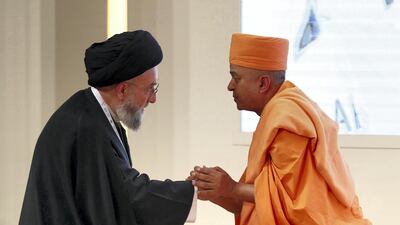Pope Francis is landing in Abu Dhabi tonight in the spirit, as he said, of a brother: to "write a page of dialogue together, and to travel paths of peace together". What is clear from both Pope Francis's warm words and the frenzy of anticipation which is set to welcome him as he touches down is that this is only the first page in a new chapter of the UAE's remarkable history. There will, no doubt, be many more written in the years to come and numerous more roads to peace travelled as spiritual leaders across the region and beyond seek to unite in cross-faith dialogue. That begins tomorrow, as the Catholic Pope – the first to visit the Arabian Peninsula – meets Dr Ahmed Al Tayeb, the Grand Imam of Al Azhar, and dozens of other religious leaders from the Muslim, Christian, Jewish, Hindu, Sikh and Buddhist faiths at the Global Conference of Human Fraternity.
The two-day conference began today, as clouds gathered in both Italy, where Pope Francis set off for his flight to the UAE, and in Abu Dhabi, drenched in an unexpectedly heavy downpour. They might not have seemed a portent of an auspicious occasion, but in the Bible and the Quran, rain is a powerful symbol of God's blessing, an instrument of renewal and rebirth. In the arrival of the Pope in the UAE's capital, many will find cause for hope and optimism in the fundamental covenant of human fraternity. Such a renewed avowal of compassion and tolerance has surely never been more needed on the planet more than it is today.
In this, the UAE’s Year of Tolerance, the attendance of Pope Francis at the fraternity conference is an event of great significance. Many will have been moved by his video message ahead of his visit, in which he began with an Arabic greeting and paid tribute to the UAE as a model of co-existence, “a meeting point of different civilisations and cultures”. And as the world watches 135,000 Roman Catholics attend an open-air mass on Tuesday with their spiritual leader, in the heart of a Muslim-majority country, perhaps it might begin to comprehend something of the true values that have defined this nation and made it such a beacon of peace and tolerance. It reaffirms the fact Christians are not only welcome and free to worship in a Muslim nation, but are also an integral part of the multi-faith fabric of society.
The Pope's visit, as Yousef Al Otaiba, the UAE ambassador to the US, stated on Saturday, will "send a strong signal across the region and the world: people with different beliefs can live, work and worship together".
None can doubt that such a coming-together of the leaders of the world’s great faiths, in a bid to find a path towards global peace, is both necessary and timely. Across the world, devout followers are being persecuted for their faith and demonised as the “other”. Last week, even as excitement about the papal visit mounted among the 700,000 Filipinos in the UAE, the Pope offered prayers for their brethren murdered in a Catholic cathedral in the Philippines, in suicide bombings linked to ISIS-affiliated extremists.
It is a common fallacy that religion sets people against people, igniting the flames of bigotry, hate and conflict. From the crusades of the Middle Ages to the barbaric attempts of groups such as ISIS to drag the world back to the darkness of those days, it is true that wars have been fought and crimes committed in the name of faith.
But as an honest reading of any of the holy texts makes clear, brutality against our fellow human beings has never been sanctioned or condoned by a higher power whose love embraces all humankind. Those who invoke faith in support of the horrors they perpetrate act not out of devotion but ignorance and fear. For justification, they rely upon a grotesque distortion of the faith they profess to follow.
This week in the UAE, the leaders of the great faiths are joining hands, not only in prayer but in an active search for a means to eradicate the ignorance responsible for so much misery around the world. As Sheikh Nahyan bin Mubarak, the UAE’s Minister of Tolerance, said, those bonds can “help us heal…tolerance and human fraternity will make us champions for human rights and obligations”.
What we are witnessing in Abu Dhabi is nothing less than an expression of true spirituality, a pragmatic yet magnificent articulation of the good that can be achieved in the name of peace and human dignity.
The goal of fraternity is not an end in itself. As Sheikh Nahyan pointed out, we live in difficult times, fraught with unforeseen challenges. Only by working together and recognising our human frailties as well as our strengths can we overcome those mountains. For that is the common purpose that ties together the leaders of the great faiths who gathered in Abu Dhabi yesterday. And it is the higher calling that brings the Pope to Abu Dhabi, where he will not only preach to tens of thousands at a mass in Zayed Sports City but will also visit an Islamic landmark with his tour of Sheikh Zayed Grand Mosque.
Respect and understanding are the bywords for a week in which we see the world as it should be: human beings living together in harmony, not divided by their differences but united and enriched by the inspiring panoply of diversity. The impact of this visit will reverberate long after the Pope has left. For this historic moment is a significant marker in the relationship between the Vatican and the Gulf, one which will bear fruit for years to come.

